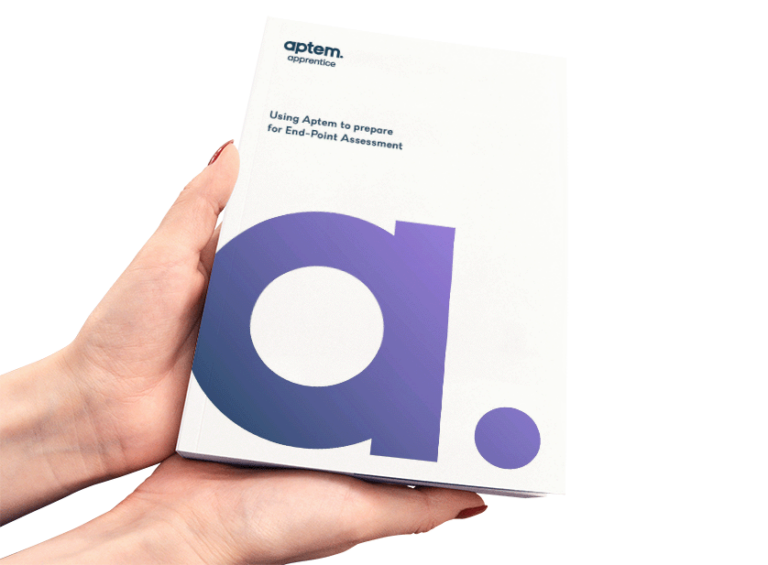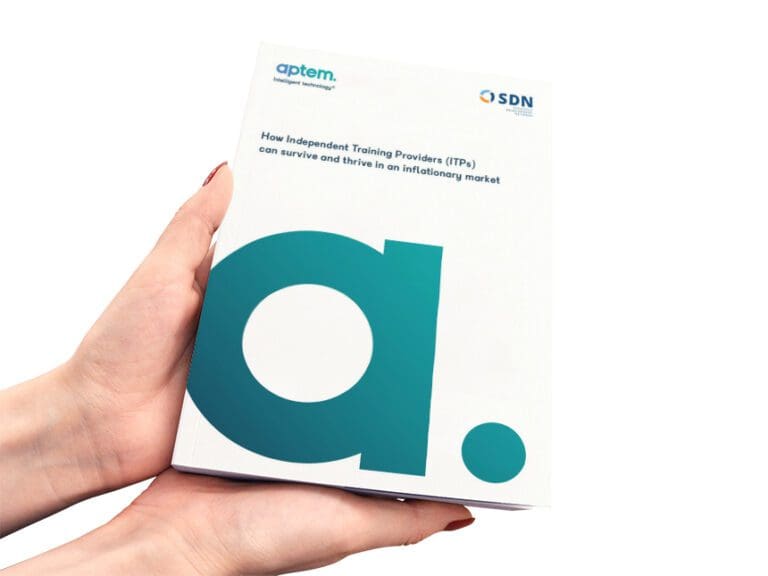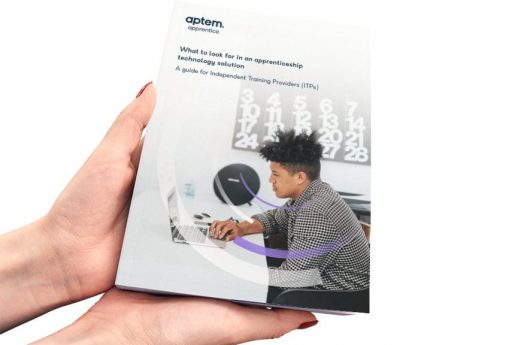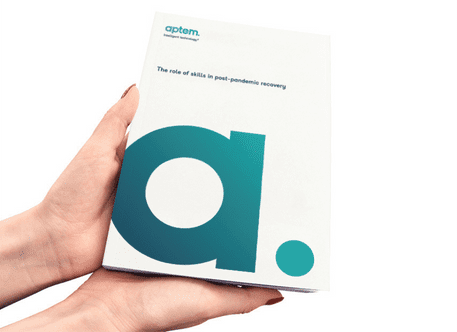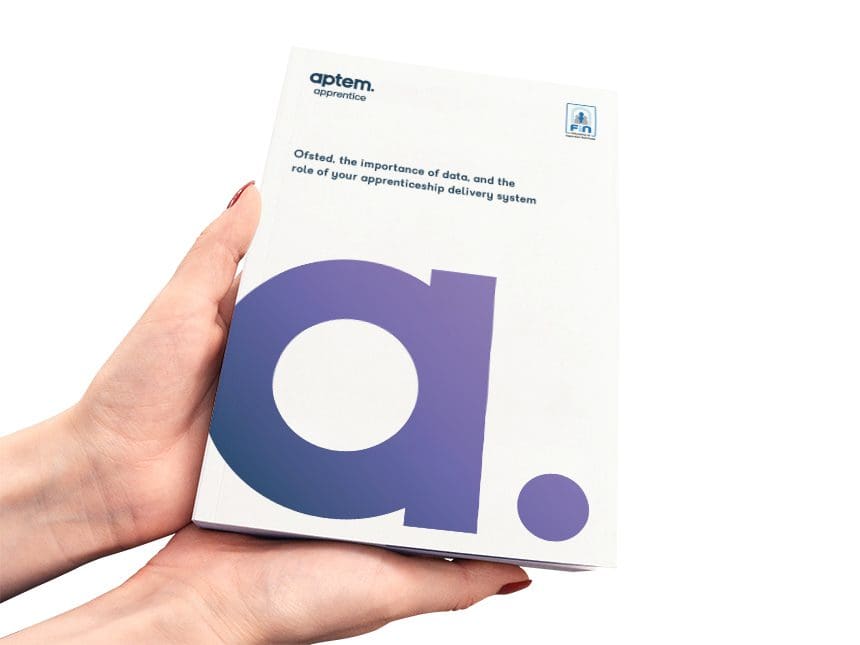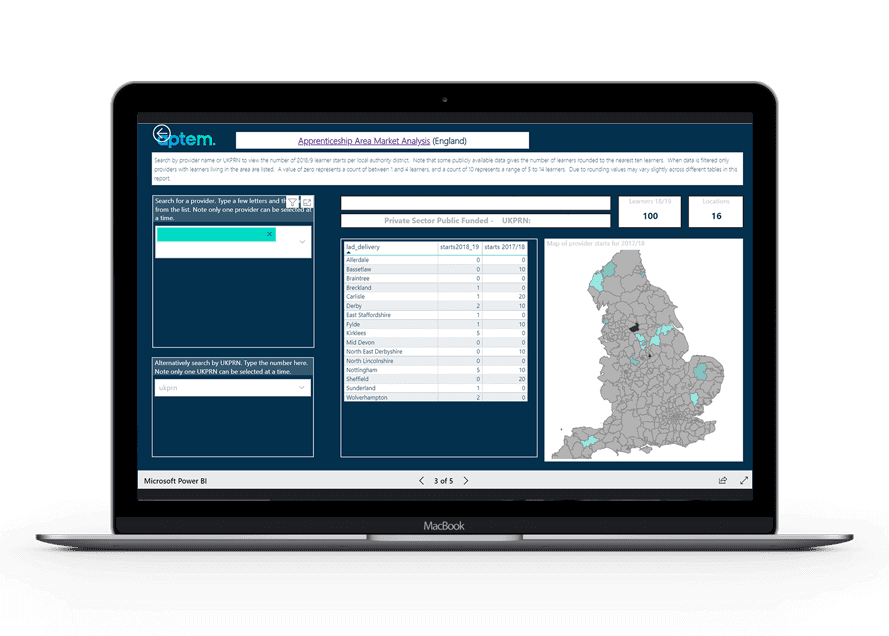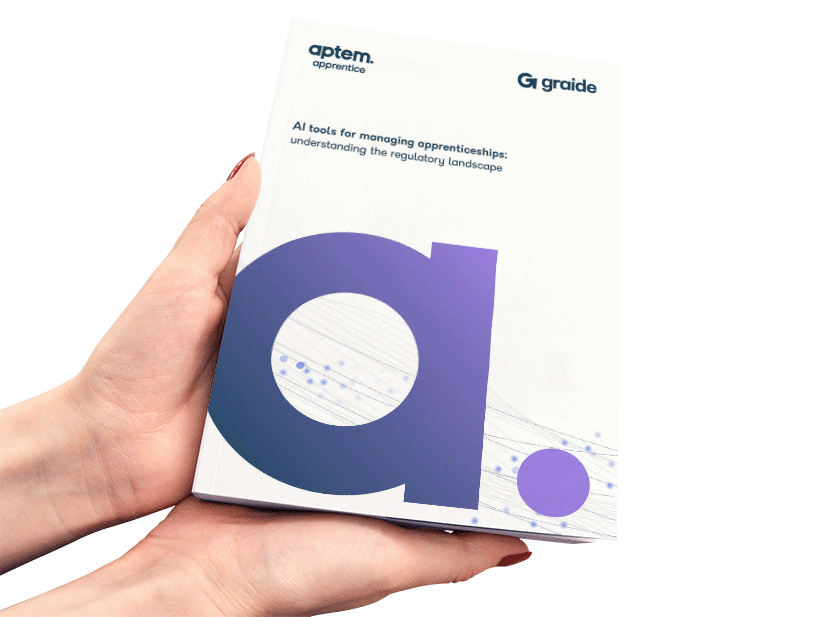Latest eBook:
Using Aptem to prepare for R14 data
submission and the new academic year
R14, known as hard close, is the name given to the final submission of Individualised Learner Record (ILR) data for any given academic year.
This eBook walks you through the hard close process and shows how Aptem’s functionality can support preparation for R14. You’ll discover practical tips for using built-in dashboards to identify and address issues before the October deadline.

Degree apprenticeships
Are degree apprenticeships 'over-regulated'?
Apprenticeships are a highly regulated form of skills training involving complex accountability structures to deliver quality and value for money.
This eBook explores the debate about the value and purpose of degree apprenticeship regulation in universities, identifying upcoming challenges in the sector. This piece also examines what universities/HE providers do to meet regulatory requirements whilst delivering high-quality degree apprenticeships.
Universities and Ofsted: learnings from recent inspections - January 2022 to December 2023
In this eBook, updated for 2024, we explore insights from the 70 university apprenticeship inspection reports that have been published by Ofsted between January 2022 and December 2023.
On behalf of Aptem, Steve Dewhurst, Independent Higher Education Consultant, has curated an analysis of these recent reports, summarising ‘good practices’ and focus development areas, with a conclusion of what is needed in order to achieve a glowing report.
What universities should look for in an end-to-end apprenticeship technology solution
This eBook outlines the core challenges universities are facing to deliver these apprenticeship programmes, and how an effective end-to-end apprenticeship technology solution can mitigate these challenges through a modern, technology-driven delivery solution.
Degree Apprenticeships: are qualifications the linchpin of success?
With contributions from Vince Cable, BIS Secretary from 2010 to 2015, Mandy Crawford-Lee at UVAC and Terry Hodgetts, Director of Corporate Client Solutions at Aston University, this white paper explores the history and rationale of the mandated qualification, the competing pressure on them with regard to integration, and the reasons why mandated qualifications matter.
FE apprenticeships
IT transformation in FE colleges
It is estimated that 70% of IT transformation projects fail. As more colleges turn to digital solutions to manage remote-learning options, business performance and Ofsted compliance, it is critical to achieve a higher success rate – not least because resources in the FE sector are scarce.
The white paper explores the reasons why digital transformation projects fail, and shares what good practices colleges can deploy to ensure the success of new systems.

Skills
Using Aptem to prepare for End-Point Assessment
This eBook is a comprehensive guide designed to help providers effectively use Aptem in preparing learners for End-Point Assessments. It offers practical insights and step-by-step instructions on leveraging Aptem’s features to streamline preparations for EPA, enhance learner engagement, and ensure successful outcomes.
How Independent Training Providers (ITPs) can survive and thrive in an inflationary market
The Strategic Development Network (SDN) and Aptem have teamed up to produce this white paper aimed at helping Independent Training Providers (ITPs) negotiate the uncertain economic and policy terrain. We have a simple goal – to offer helpful information to training providers to help them survive and deliver what the UK needs – a skilled, successful and happy workforce.
What is to be done about the UK’s skills deficit?
In this white paper, we do a deep dive into why skills matter to business, the economy and to individuals.
- The historical context of education and skills in the UK
- Rationales for increased investment:
- Economic
- Society
- Individual
- What is needed to be done about the UK skill deficit
For anyone who wants to make the case for more policy attention and funding for skills, why we need better data, and why policy sometimes makes an unfair distinction between skills and academic learning, this is a must-read.
What should ITPs look for when sourcing apprenticeship technology?
This eBook discusses the factors ITPs should look for when sourcing an end-to-end apprenticeship solution. From compliance and quality assurance, to use of automation, learner progress tracking and, of course, reducing apprenticeship delivery costs by up to 15%, this guide walks through what ITPs should expect and question, when moving to an end-to-end solution.
Why a 'one size fits all' approach to tech is not an option for leading ITPs
The Independent Training Provider (ITP) industry is growing. Accordingly, it’s becoming more and more competitive. Leading ITPs looking to grow need to be able to differentiate their offering and, alongside readiness to increase apprenticeship provision, be prepared to diversify into other areas such as Adult Education Budget programmes, traineeships and other commercial training.
Why should you select a training provider that uses Aptem Apprentice?
As an employer, selecting a training provider can be challenging. You want a provider that understands your business and delivers high-quality training, while giving you full transparency into the apprenticeship delivery. In this short eBook we discuss the importance from an employer perspective, of working with a platform that places quality and compliance at the heart of its solution.
The role of skills in post-pandemic recovery
In this follow up to our white paper: What is to be done about the UK’s skills deficit?, we look at what has changed and is likely to change, other priorities for education and training in light of the pandemic experience, and we deep dive into two countries’ approaches to comparative education and training: Finland and Singapore.
We conclude by making some recommendations based on our analysis, of what the sector should be asking for.
Data
Ofsted, the importance of data, and the role of your apprenticeship delivery system
There is a common misconception among providers that Ofsted isn’t interested in data. The truth is that they have always been interested in data – from the perspective of how you use data to drive your provision.
This eBook explores some of the recurring ‘areas for improvement’ on which Ofsted is focusing its inspections, with a specific focus on how providers can pre-empt the scrutiny with relevant, actionable data collection. It offers practical insight into how Aptem, as your apprenticeship management system, can support you in being Ofsted-ready, throughout the inspection lifecycle.
Aptem Intelligence Dashboard
DfE apprenticeship reporting data is hugely insightful but it is incredibly difficult to extract information from it. We have created a free dashboarding tool that makes it easy for apprenticeship providers to analyse trends, see offerings gaps, produce competitor analysis, and make data-driven strategic decisions from the DfE data.

Compliance
AI tools for managing apprenticeships: understanding the regulatory landscape
This eBook explores the Ofsted and Ofqual guidelines relating to the use of AI. It offers helpful resources for apprenticeship providers keen to make use of the efficiency and engagement benefits of AI tools while maintaining high standards of quality and compliance.
Using Aptem to inform your Self-Assessment Report (SAR)
Ofsted expects providers to be able to demonstrate that they are rigorously self-assessing and working to a quality improvement plan. The SAR is designed as a tool to help you do just that.
This eBook breaks down the SAR process – what your SAR might include, the role of data in a SAR, and how you can use Aptem to evidence the performance of your provision. Plus, we provide valuable insights and tips to support Ofsted preparations.
Using Aptem to prepare for a DfE Audit
Successful DfE Audits rely on training providers being confident about the accuracy of their funding claim and being able to back up decisions with robust evidence. The agency is purely interested in the data, the funding, and your evidence to support the funding claim. The ILR data that providers submit on a monthly basis is critical to this.
This eBook explores the DfE audit process, the preparation needed for a successful outcome and the role of Aptem in helping to ensure you meet the requirements of a DfE audit.
Universities and Ofsted: learnings from recent inspections - January 2022 to December 2023
In this eBook, updated for 2024, we explore insights from the 70 university apprenticeship inspection reports that have been published by Ofsted between January 2022 and December 2023.
On behalf of Aptem, Steve Dewhurst, Independent Higher Education Consultant, has curated an analysis of these recent reports, summarising ‘good practices’ and focus development areas, with a conclusion of what is needed in order to achieve a glowing report.
Ofsted, the importance of data, and the role of your apprenticeship delivery system
There is a common misconception among providers that Ofsted isn’t interested in data. The truth is that they have always been interested in data – from the perspective of how you use data to drive your provision.
This eBook explores some of the recurring ‘areas for improvement’ on which Ofsted is focusing its inspections, with a specific focus on how providers can pre-empt the scrutiny with relevant, actionable data collection. It offers practical insight into how Aptem, as your apprenticeship management system, can support you in being Ofsted-ready, throughout the inspection lifecycle.
Change management
Overcoming resistance to change: implementing new technology
Technology has become one of the biggest drivers of change, as well as a significant aid to the change process. It can be both the cause for, and a way to smooth, a change project.
This white paper covers the key areas and approaches that enable a successful change management strategy.

Employability
How the pandemic has deepened existing inequality especially within employability
The pandemic spearheaded intense change throughout society. Businesses rapidly adopted new ways of working to survive, such as remote working, new communication styles, new strategies and widespread behavioural change. Our white paper provides insight on how the pandemic has affected pre-existing inequalities and explores how the pandemic has deepened them, with a focus on employability.
Technology: the missing link in effective employability solutions
The employability sector has faced extreme difficulties as a result of the Covid-19 crisis of 2020. Unemployment has rocketed, redundancies have increased, and recruitment has slowed down. This white paper explores how technology can be utilised to create effective solutions that enable jobseekers to get back to work. The research explores sound evidence that seeks to explain how technology can aid the recovery of the sector.
Exploring alternative talent pools for recruiting employability professionals
The employability sector is gearing up to support a large cohort of unemployed people as the economic impact of the Covid-19 pandemic takes hold. The sector is going to need to both rapidly scale its adviser workforce to cope with the growing demand and find more efficient ways to manage mass re-employment activity at scale. This research develops a sound evidence base to help service providers (public, private and voluntary sector) target their Adviser recruitment efforts and think creatively about where they can attract new talent for the sector.
Employment outcomes research study
In the research we cover:
- The Impact of Aptem Employ on jobseeker outcome
- How engagement frequency with technology impacts outcome
- Impact of technology on outcome for job-ready jobseekers
- Impact of technology on outcome for long-term unemployed.
Employability impacts study
- Revenue potential if using Aptem Employ
- Sustained employment outcomes using Aptem Employ
- The impact of geography on sustained employment

We'd love to hear from you
The best way to experience our platform is through a consultative chat with one of our friendly experts. They can take you through the system and show you the benefits of Aptem that are most relevant to your business.
- Simplify your delivery with Aptem.
- Increase efficiency with workflows, automation and streamlined processes.
- Get insights into your delivery performance using Aptem's reporting tools.







